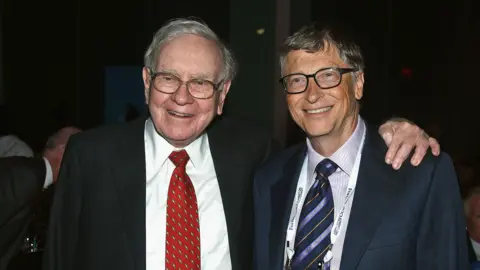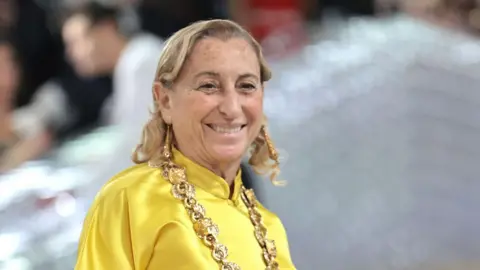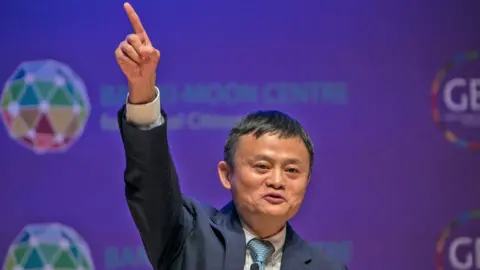
Timing, luck or talent – what makes a billionaire?
- Published By Jane Njeri For The Statesman Digital
- 1 year ago
What do an Italian communist student of mime, a toddler with an eye for a ball and a comedian who jokes about nothing have in common?
They all went on to become members of a very select global club.
Miuccia Prada, Tiger Woods and Jerry Seinfeld are among about 2,800 people on the planet who are US-dollar billionaires.
But the list of super-rich is very international.
According to the American media firm Forbes, which tracks the fortunes of the world’s richest, the United States has 813 billionaires, China (including Hong Kong) is second with 473, and India is third with 200.
The BBC World Service podcast Good Bad Billionaire is back. From celebs and CEOs to sport stars and tech titans, each episode looks at how some of the world’s billionaires made their fortunes. Presenters Simon Jack and Zing Tsjeng consider their wealth, power, philanthropy and legacy, and whether they think they are good, bad or just incredibly rich.
The size of these fortunes can be hard to comprehend. A billion is a huge number – to give an idea of scale, one million seconds is 11 days, but a billion is 32 years.
And for some, the very existence of billionaires is obscene.
Eighty-one of the world’s richest people – about a bus-full – have more combined wealth than the poorest four billion people in the world.
In a 2023 report on inequality, Oxfam concluded: “Every billionaire is a policy mistake. The very existence of booming billionaires and record profits, while most people face austerity, rising poverty, and a cost-of-living crisis, is evidence of an economic system that fails to deliver for humanity.”
That inequality has led to calls in many countries for taxes on absolute wealth rather than income. In the US, Democratic Party Senator Elizabeth Warren proposed a 2% tax on assets over $50m (£39m) and 3% on assets over $1bn (£778m).
 Getty Images
Getty ImagesBut others argue the prospect of great wealth inspires creation and innovation that improves the lives of millions of people.
American economist Michael Strain argues we need more billionaires, not fewer, and cites Nobel prize winner William Nordhaus who found that about 2% of the returns from technological innovation go to the founders and inventors – the rest goes to society.
Strain calls billionaires “largely self-made innovators who have changed the way we live”. He cites examples such as Bill Gates and Steve Ballmer who revolutionised personal computing, legendary investor Warren Buffett, Jeff Bezos who upended retail, and Elon Musk who disrupted the automotive industry and space commerce.
“None of them are ‘policy failures’,” he concludes. “Rather than wishing they did not exist, we should be thrilled that they do.”
 Getty Images
Getty ImagesMany billionaires also donate large sums to charity. Gates and Buffett developed “The Giving Pledge” – a commitment to give away over half one’s wealth over their lifetime.
Rapper, business mogul and billionaire Jay-Z, although not signed up to the pledge, offered this pithy defence of his wealth: “I can’t help the poor if I’m one of them. So I got rich and gave back. To me that’s the win-win.”
Billionaires don’t get rich in a vacuum. Their success also tells us something about ourselves.
It is hard to get very, very rich unless you are providing something that people either need, want or enjoy.
Whether it is the minimalist stylings of Prada, the Star Wars movies or TikTok, the billionaires we discuss on the podcast have changed the world to a greater or lesser degree – and the stories as to how they did it are compelling.
For example, the founders of Google tried to sell an early version of their search engine for $1m but there were no takers. Today Google is worth $2.3tn and cofounder Sergey Brin is personally worth $135bn – roughly the GDP of Morocco.
 Getty Images
Getty ImagesMaria Bianchi was a card-carrying communist in 1960s Italy studying mime at theatre school before she changed her name to Miuccia Prada.
India’s first self-made female billionaire, Kiran Mazumdar-Shaw, started out brewing beer before she hit gender bias and tried pharmaceuticals instead, becoming Asia’s biggest producer of insulin.
Jerry Seinfeld’s parents were both orphans and his father never hugged him. Perhaps one of the reasons that he and Larry David had a rule for the characters in their smash hit comedy Seinfeld: “No hugging and no learning.”
 Getty Images
Getty ImagesThe individual success of these billionaires also often tells a tale of wider historical, political or technological trends.
Tech entrepreneur Jack Ma, who co-founded the Alibaba group, was the beneficiary of two powerful and simultaneous forces – the birth of online retail and China’s rising economic power and mass affluence.
Chuck Feeney, the man who invented duty-free shopping (and gave his entire fortune away) rode a wave of outbound Japanese tourism after World War Two.
 Getty Images
Getty ImagesThere are the stories where luck played a part.
Microsoft founder Bill Gates happened to go to one of the very few schools in the US in the late 1960s that had a computer. While singer and business woman Rihanna got her break thanks to a chance audition with a record producer who happened to be on holiday in Barbados.
And let’s hear it for the parents.
Taylor Swift’s entire family moved from Pennsylvania to Nashville to further their teenage daughter’s career while Michael Jordan’s mum suggested he should “hear what Nike has to say” before signing a deal with either Adidas or Converse – paving the way for the most lucrative sports endorsement deal in history.
But when doors open, you have to walk through them, and if there is one common denominator it’s the energy, drive and commitment that these people have brought to their respective disciplines. Plus their desire to press on, when many would have checked out long ago.
My Good Bad Billionaire co-presenter Zing Tsjeng and I always joke that when we got to, say, $10m, you wouldn’t see us for dust – there would just be two revolving chairs as evidence I had gone fishing and she’d gone to yet another music festival.
I guess people like us will never make it big but we’ve been by turns fascinated, charmed, moved, appalled and terrified by those who have.
Share on
Tags
SHARE YOUR COMMENT
MORE STORIES FOR YOU
Trending Stories
DJ Mo’s former illicit lo...
- Published By Jane
- January 15, 2024
Mapenzi! Zari and Tanasha...
- Published By Jane
- October 24, 2023
Zuchu Speaks on Diamond P...
- Published By Jane
- October 12, 2023
Hio Ni Upumbavu Wasituche...
- Published By Jane
- November 8, 2023
RECOMMENDED FOR YOU
How People are Using AI t...
- Published By The
- October 29, 2025
Why Parents Should Spend...
- Published By The
- October 29, 2025
What is Ayurveda? Raila O...
- Published By The
- October 29, 2025
How Raila Odinga’s Death...
- Published By The
- October 29, 2025
Latest Stories
"Lazima Niwe Serious Sasa...
- Published By Jedida
- November 24, 2025
Sky Victor Narrates The E...
- Published By Jedida
- November 24, 2025
Rose Muhando Reveals Heal...
- Published By Jedida
- November 24, 2025
Betty Kyallo, Charlie Cel...
- Published By Jedida
- November 24, 2025



